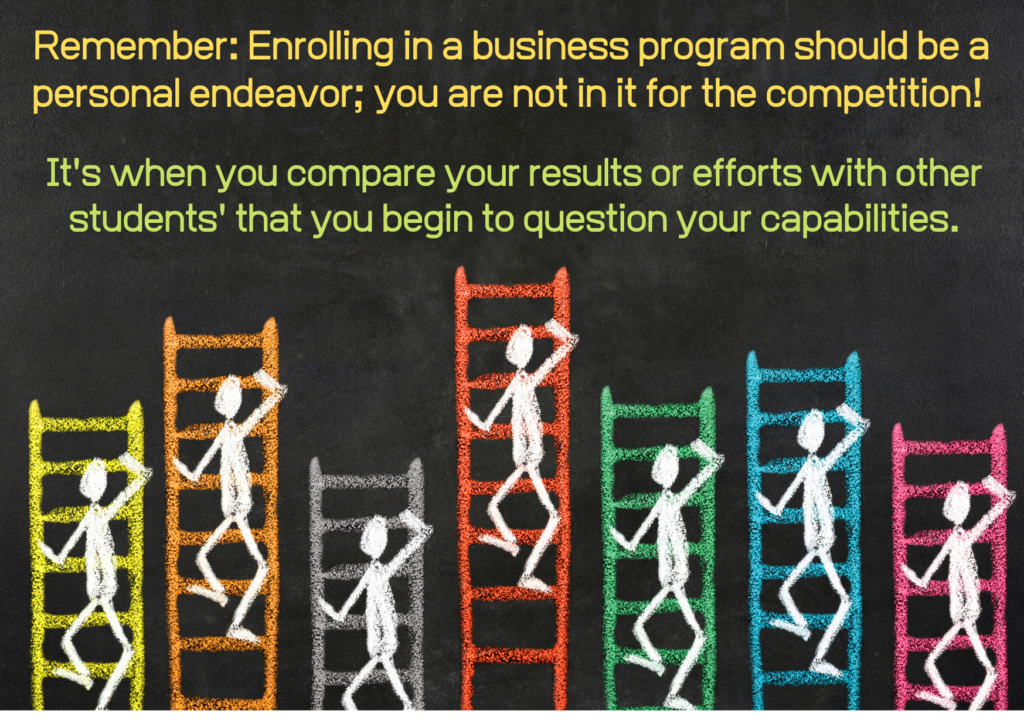Find Your Perfect Business Degree
www.business-management-degree.net is an advertising-supported site. Featured or trusted partner programs and all school search, finder, or match results are for schools that compensate us. This compensation does not influence our school rankings, resource guides, or other editorially-independent information published on this site.
Are you thinking of enrolling in a business school? One of the most common questions would be, “What can I do to prepare myself for business school better?”
Just like you, thousands of students seek to pursue the challenging yet highly promising journey to a Business program. Roughly 14% of Master’s of Business Administration students had an employment background in the financial services industry. While it may be rewarding and fruitful in the end, MBA students generally go through the rigors and challenges exclusive to the discipline.
For the underprepared, a business school is a maze. If you’re juggling personal and professional obligations to make ends meet, you will find the journey overwhelmingly stressful. Regardless, thousands of Business students make it through business school, eventually completing their degrees and landing more fulfilling and lucrative careers.
Every business school has its unique culture and program, but there are common hurdles that all business students must overcome. We don’t mean to overwhelm or discourage you; in fact, your feelings of vulnerability and fear are valid. However, just like you, many others feel the same way. Indeed, you are not alone in this endeavor.
Business school can be an enjoyable but challenging learning experience. By establishing positive study habits, networking, and taking advantage of school resources, you can easily survive and thrive throughout your business school journey.
Here are ten tips to succeed and survive in business school:
Choose Your Specialization
Choosing your Business degree concentration helps you set your goals right and avoid confusion in the middle of your academic journey. While not mandatory, focusing on your options—including in the areas of Management, Finance, Communication, or Human Resources—can give you the specialized knowledge and training you need in the professional setting.

If you’re unsure initially, talk to an academic advisor. You can also take different personality tests, such as the StrengthsFinder, or Myers-Briggs, to help you determine which path to take. After all, you don’t want to be enrolled in a Management concentration only to find out in the middle of your academic year that your calling is in the H.R. specialization.
Learn Time Management
A Business program favors students who know how to work their priorities and limits around their schedule. Learn what to prioritize and when to multi-task. The course workload will be overwhelming, but find time to go outside and gain the experience you need for the career you want. Volunteer, attend networking events, take on internship opportunities, or establish a start-up business.

However, rethink your decisions before signing up. It is easy to be overwhelmed and say yes to all opportunities even when you neither need nor have time for them. If you are an international student, it can be even more challenging. Aside from meeting the demands of your course workload, you will be adjusting to a new culture.
Reach Out To People And Don’t Be Afraid to Ask for Help
Business programs, particularly the graduate levels, will challenge you. You are likely to experience self-doubt and anxiety halfway through your first few years. Find comfort in knowing everyone who is on the same journey as you are is going through the same experience. The reason why they seem to have everything under control is that they don’t let the setbacks get the best of them.
If you find yourself hardly coping with business school, take a deep breath. Take a break and reach out to your trusted advisors and colleagues who will listen. Join a study group where you can talk to those who understand what you are going through.
Explore Internship Opportunities and Networking Organizations
Internships are a great way to learn and build your professional business network early on. They also give you a glimpse of the business settings that you will be part of in the future.

Did you know that an internship program also helps you secure a future career? The National Association of Colleges and Employers Internship Survey reported that in 2016, 72.7% of students received employment offers from their previous internships with organizations.
Avoid Comparing Yourself to Others
In a typical business school, you will always be surrounded by like-minded people. It’s when you compare yourself to other students that you begin to question your capabilities.

Remember that not all business students share cultural, academic, and professional backgrounds. There is no solid baseline for comparison, as each experience is unique. Despite being enrolled in a highly competitive business program, you are not in it for the competition.
The perfect yardstick is your own set of goals. Are you getting closer to them or slacking on your efforts? Doing this lets you evaluate your progress, correct your mistakes, and make constant improvements.
Avoid Seeking Perfection
It’s not uncommon to feel daunted by the overwhelming coursework in business school. Be idealistic and work hard, but set your expectations right. Striving for perfection will burn you out.
Here’s a tip that works: don’t attempt to be a master of it all. Remember that a business program introduces you to new skills and equips you with new tools for competence and leadership. It will take a while to gain a mastery of them.
Take Risks
A significant amount of the learning process happens outside the classroom. You don’t learn only from what is written in your textbook or learning resources; your social learning curve plays a key role in shaping you into a competent business professional.
Grow academically and socially by pushing yourself to the limits. Join seminars on completely unfamiliar topics; the new knowledge may prove to be invaluable soon! Rediscover your potential by joining clubs and organizations.
When you step out of your comfort zone and take risks, you expose yourself to new ways of thinking that will help you navigate the diverse and vast business environment. The whole point of taking risks is self-discovery.
Learn Classroom Etiquette
Because your instructors and peers may become your potential colleagues in the future, give them the respect they deserve. This is called basic etiquette.
Your skills and expertise to succeed in your Business program won’t cut it; your character is what defines you. Be polite, extend courtesy, and address your professors respectfully. Adhere to the rules of your classroom and school, such as phone use restrictions in class.
Get an Inside View
Ask those who came before you and successfully made it in the business field. Ask about their business school experience and get some tips for surviving and thriving in it.
Aside from gaining information and tips for business school success, asking around helps build your network and establish professional relationships within your circle. Based on the information you get from them, you can now adjust your sails and navigate your business program well.
Don’t take R&R for Granted
Business schools, particularly for graduate-level studies, can take up all your time and energy, so don’t feel guilty for taking time off for yourself.

Taking some R&R is much like pressing the reset button. Take a breather with your family and friends. Take a relaxing walk in the park, read your favorite book, watch a movie, or treat yourself to a nice meal in your favorite restaurant.
Deciding against rest or relaxation will result in low energy and poor performance. Worse, you will get sick or have an emotional breakdown.
Here are some business and business-related organizations that are worth checking out:
ø American Business Women’s Association
The American Business Women’s Association aims to advocate and promote women in business across the U.S. Every year, ABWA members enjoy education and leadership opportunities as well as 5,000 networking and business meetings.
ø National Association of Professional Women
The National Association of Professional Women conducts career services and networking events and offers educational tools to more than 850,000 members across the country. NAPW members can participate in one out of 200 local chapters to connect with other women professionals and utilize the association’s online networking website.
ø National Black MBA Association
One of the country’s most prominent professional minority groups, The National Black MBA Association hosts conferences and offers career services, GMAT test preparation, scholarship programs, and other networking-related programs. The association strives to ensure the success of the U.S.’s black youth and help African-American businessmen and businesswomen.
ø National Business and Economics Society
The National Business and Economics Society emphasizes advocating practical research and interdisciplinary principles in business and other related industries. NBES members enjoy annual conferences that provide them the opportunity to connect with other professionals and share their knowledge and expertise.
ø National Society for Hispanic MBAs
The National Society for Hispanic MBAs was launched to help Hispanics with MBA programs achieve their business aspirations by providing them with education, career, and leadership opportunities. In 2015, they expanded their coverage by empowering high school and undergraduate students to pursue business studies.
ø Professional Business Network Association
The Professional Business Network Association is a non-profit society that helps professionals and businesses generate profit and establish professional connections with others through referral meetings conducted every month.
What to do if You Simply get Burnt Out on Business School
If you find that you are getting burnt out on business school, the most important step is to take a step back and reevaluate your goals. Consider why you wanted to go to business school in the first place and if the goals you set still align with that original purpose.
It may be helpful to reach out to professors, classmates, and alumni of the business school to get their perspectives on your situation. If you feel that you are on the wrong track, you may want to consider taking a break from school or taking a less intensive course load.
Additionally, it is essential to take time for yourself to relax, practice self-care, and engage in activities that give you enjoyment and motivation! Don’t give up on your goals or yourself!
